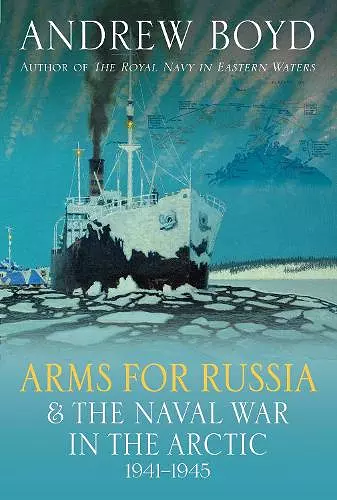Arms for Russia & The Naval War in the Arctic, 1941–1945
Format:Hardback
Publisher:Pen & Sword Books Ltd
Published:4th Oct '24
Should be back in stock very soon

This major new work fundamentally reassesses the operations by the Western allies to deliver war supplies to Russia via the Arctic sea route between 1941 and 1945\. It explores the motives underpinning Western aid, its real impact on the Soviet war effort, and its influence on wider Allied and German strategy as the war developed. It brings to life key participants, political and military, describes the interaction of intelligence with high policy and tactics, and brings a fresh perspective to key events, including the notorious convoy PQ 17. The book disputes the long-standing view that aid to Russia was essentially discretionary, lacking military rationale and undertaken primarily to meet political objectives, with only a minor impact on Soviet war potential. It shows that aid was always grounded in strategic necessity, with the Arctic supply route a constant preoccupation of British and American leaders, absorbing perhaps twenty per cent of Royal Navy resources after 1941 and a significant share of Allied merchant shipping badly needed in other theatres. The Soviet claim, determinedly promoted through the Cold War, that aid was marginal, still influences attitudes in Vladimir Putin’s Russia and contemporary Western opinion. It even resonates through the present war in Ukraine. Andrew Boyd demonstrates that in reality, Western aid through the Arctic was a critical multiplier of Soviet military power throughout the war and perhaps even enabled Russia’s very survival in 1942; and he makes plain that the British contribution to the aid effort was greater than generally acknowledged. The book also emphasises that the Arctic conflict was not framed solely by the supply convoys, important though they were. British, German and Russian operations in a theatre – defined by Adolph Hitler in early 1942 as the ‘zone of destiny’ – were shaped by other perceived opportunities and threats. For instance, Germany concentrated its fleet in Norway to forestall a potential British attack while attempting land offensives to cut Russia’s links with its northern ports. It also had vital raw materials to protect. Britain explored potential operations with Russia to dislodge Germany from the Arctic coast and sever her access to important resources. Elegantly written written and incorporating many new perspectives on the Arctic theatre, this new work should find a place on the shelves of every historian, scholar and enthusiast whose interests extend to the Russian dimension of the Second World War.
'There are still arguments over whether aid to the Soviet Union mattered in World War Two, but Andrew Boyd convincingly shows not only that it did, but that the dangerous route in the Arctic took much more of the credit in the early years of aid than is usually acknowledged. This will be an indispensable guide to just what the Arctic convoys achieved.’ -- Richard Overy, Honorary Professor of History, University of Exeter
‘A timely, original and compelling reassessment’ -- Mark Harrison, Emeritus Professor of Economics, University of Warwick
‘Andrew Boyd’s richly detailed new study explains how essential was the contribution the Western Allies made to saving Russia from German invasion. More than that, he supplies an important corrective to received opinions by showing how the major sea campaigns were not separate theatres of war but closely tied together.’ -- Professor Nicholas Rodger, author of The Naval History of Britain
This fascinating reassessment of the significance of Western support to the Soviet struggle against Hitler contains compelling new perspectives on the Arctic convoys and new insights into the wider Arctic war; it explains why Western aid was an important force multiplier of Soviet military power throughout the War and underpinned Russia’s very survival in 1942. ‘Readers familiar with Andy Boyd’s work will expect a new and challenging assessment of this complex campaign: they will not be disappointed.’ -- Professor Andrew Lambert, King’s College, London
ISBN: 9781399038867
Dimensions: unknown
Weight: unknown
576 pages